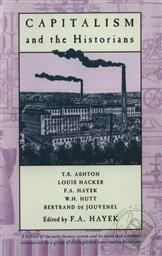Capitalism and the Historians (Book/ Paperback)
by F. A. HayekProduct Overview
Even today, social scientists and historians continue to treat the Industrial Revolution as if it were the beginning of the end of civilization.
What the essays in this book do is show the opposite. It was in many ways the beginning of a new civilization that permitted a high standard of living for the mass of the population, and resulted in longer and healthier lives. It was not characterized by coercion and social devastation but rather increased freedom and individual choice.
Subsequent research by later scholars comfirmed the analysis you will find in these pages.
Hayek himself writes the long introduction. T.S. Ashton write on "The Treatment of Capitalism by Historians," L.M. Hacker exposes "The Anticapitalist Bias of American Historians," and Bertrand de Jouvenel covers "The Treatment of Capitalism by Continental Historians."
T.S. Ashton picks up the argument again with a detailed account of "The Standard of Life of the Workers in England, 1790-1830," and W.H. Hutt writes the essay for which he is most famous: "The Factory System of thee Early Ninetheenth Century."
About the Author(s)
F. A. Hayek
Friedrich August Hayek (Friedrich A. Hakey) (1899-1992), recipient of the Medal of Freedom in 1991 and co-winner of the Nobel Memorial Prize in Economics in 1974, was a pioneer in monetary theory and the principal proponent of libertarianism in the twentieth century. He taught at the University of London, the University of Chicago, and the University of Freiburg. His influence on the economic policies in capitalist countries has been profound, especially during the Reagan administration in the U.S. and the Thatcher government in the U.K.
Our Price: $28.00
You Save:
+ Free Shipping w/ $45 min. purchase
Category: History
Format: Book (Paperback)
Publisher: University of Chicago Press
Date Published: May 16, 2005
Language: English
ISBN: 9780226320724
SKU: LT-455
Dimensions: 5.25 x 8.00 x 0.50 (in)
Weight: 7.40 oz










